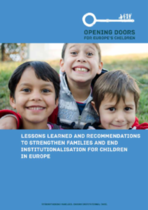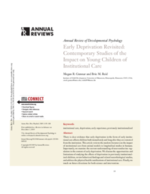Lessons Learned and Recommendations to Strengthen Families and End Institutionalisation for Children in Europe
Based on the information gathered throughout the course of the Opening Doors for Europe’s Children campaign, this final report first reflects on: (1) the rationale for the campaign and how it operated; (2) the progress towards child protection system reform across campaign countries as well as the developments at the EU level; and (3) the lessons learnt from the campaign and some final recommendations to the European Union.


